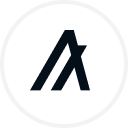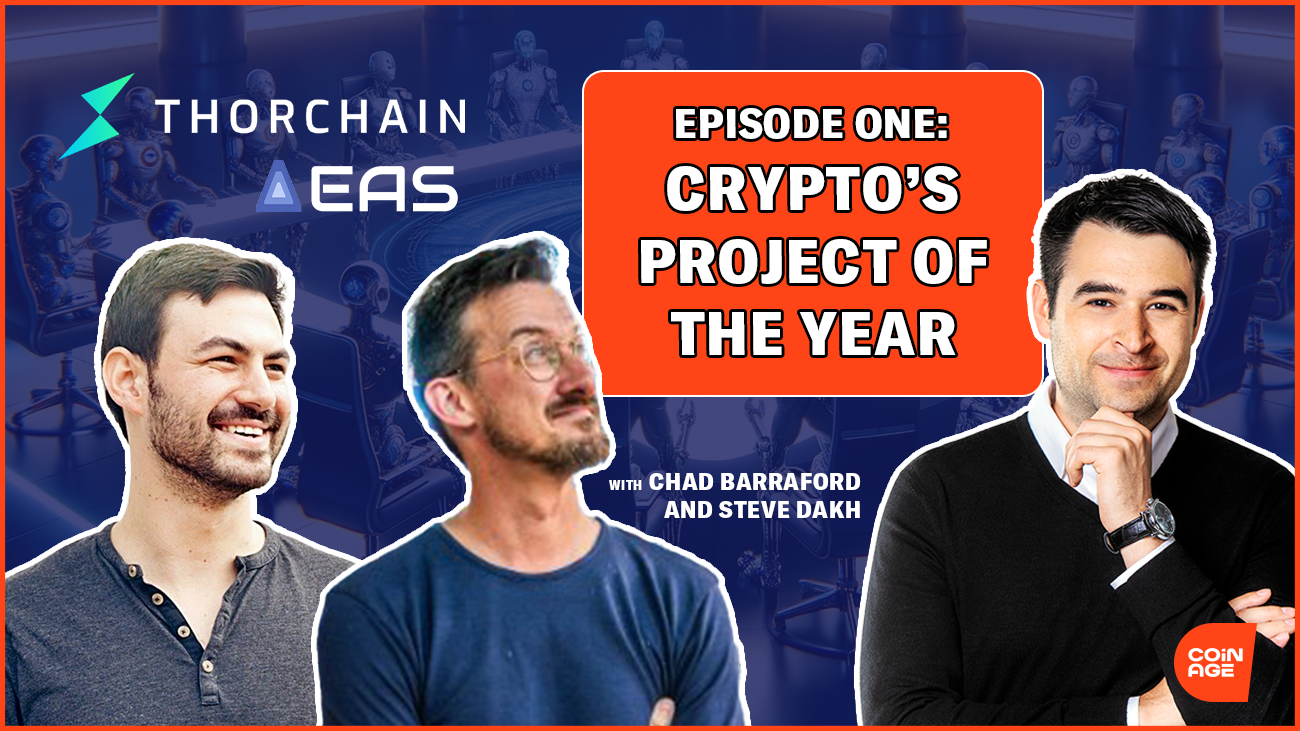Blockworks • Apr 25, 24
Algorand courts Python devs in ‘seismic change’
The Algorand Foundation touts the network as first to go after pool of 10 million global developers
Read more



Create a Coinbase account to buy and sell Algorand on the most secure crypto exchange.
Algorand is a cryptocurrency and blockchain protocol that aims to be simultaneously scalable, secure, and decentralized. It uses a consensus algorithm called pure proof-of-stake.
Algorand (ALGO) is a decentralized, blockchain-based network that strives to support a wide range of applications. It was designed with the goal of improving transaction speeds and efficiency, addressing the slow transaction times associated with other blockchains. Algorand's unique architecture is based on a permissionless pure proof-of-stake (PoS) blockchain protocol, which eliminates the need for energy-intensive mining processes. The network went live in June 2019 and aims to handle a significant number of transactions per day. Algorand's native cryptocurrency, ALGO, plays a crucial role in the network's operation, with compensation for block creation distributed among all coin holders.
Algorand operates on a permissionless pure proof-of-stake (PoS) blockchain protocol. Unlike proof-of-work (PoW) blockchains, where the root block must be validated by randomly-selected validators using computing power, in Algorand's pure proof-of-stake approach, all validators are known to each other and only need to agree on the next block to create a new one. Algorand employs a two-phase block manufacturing procedure that includes proposing and voting. By staking ALGO and establishing a valid participation key, every member of the Algorand network can participate in this process. Compensation is provided at regular intervals, which may encourage participation in the Algorand network.
Algorand aims to support a broad spectrum of applications, with its secure, scalable, and efficient systems being particularly suited for real-world applications that require reliable performance guarantees. The network's low transaction fees and fast transaction times make it a suitable platform for a variety of use cases. Furthermore, Algorand's compatibility with Ethereum, facilitated by a bridge, aims to connect to Ethereum's DApp ecosystem, potentially attracting more participants to its own ecosystem. The network's goal is to eventually solidify the DeFi ecosystem on Algorand.
Algorand was founded by Silvio Micali, a professor of computer science at the Massachusetts Institute of Technology. Micali, a recipient of the Turing Award in 2012 for his contributions to the theory and practice of secure two-party computation, electronic cash, cryptocurrencies, and blockchain protocols, is recognized as a contributor to the crypto space. The Algorand mainnet went live in June 2019, and by December 2020, it was capable of handling a significant number of transactions per day. The initial token distribution for Algorand took place in June 2019. The Algorand blockchain's genesis indicates that a large quantity of ALGO was created, with the distribution of this set amount projected to conclude in 2030.
Algorand differentiates itself from other blockchain platforms through its distinct features and technology. It employs a Pure Proof-of-Stake (PPoS) consensus mechanism, which aims to ensure fairness and security by making it challenging for a minority to cheat and a majority to act dishonestly. Algorand features a non-forkable chain, aiming to reduce the uncertainty and potential issues associated with blockchain forking. In terms of security, Algorand uses a distinct approach to tackle corruption, striving to make it difficult for adversaries to launch successful DoS attacks. Algorand aims to maintain scalability by ensuring that regardless of the number of users in the system, the maximum number of short messages propagated is 1000. Algorand supports decentralization by not having a fixed set of users in charge of choosing or approving the next block. Instead, committees are randomly selected in secrecy from time to time, aiming to allow everyone an opportunity to participate in the generation of a new block.
Algorand employs a unique consensus algorithm known as Pure Proof-of-Stake (PPoS). Unlike Proof-of-Work (PoW) or traditional Proof-of-Stake (PoS) consensus algorithms, PPoS has certain characteristics. It aims to provide a level of security through the use of a verifiable random function (VRF) to select validators randomly. This design could potentially make it difficult for any one validator to manipulate the network, as they cannot predict when they will be selected to validate transactions. PPoS has a design that could potentially handle a large number of transactions, which could make it suitable for applications that require high throughput. PPoS has a structure that allows for participation in the validation process, which could help to prevent centralization and ensure that the network remains secure and resilient. Furthermore, PPoS has a design that aims to use less energy, as it doesn’t require validators to perform complex calculations to validate transactions. Lastly, PPoS has a design that allows for participation without specialized hardware, meaning that anyone with a stake in the network can participate, regardless of their technical expertise or financial resources.
The Algo token is the native cryptocurrency of the Algorand blockchain and has a multifaceted role within its ecosystem. It is used to facilitate transactions, acquire on-chain items such as Non-Fungible Tokens (NFTs), and obtain goods and services. Algo token holders may engage in Decentralized Finance (DeFi) activities, receiving non-monetary incentives for their involvement. The token contributes to consensus among participation nodes, aiding in the overall stability of the Algorand network. Moreover, Algo token holders can participate in the decision-making process of the Algorand ecosystem, fostering a sense of community and shared ownership. The Algo token plays a role in facilitating transactions, encouraging participation, and facilitating decentralization within the Algorand ecosystem.
Yes, developers have the ability to build decentralized applications (DApps) on the Algorand blockchain. Algorand offers a platform that can be utilized for creating DApps, utilizing its Pure Proof-of-Stake consensus mechanism. Developers have the option to write smart contracts in Python using the PyTeal library, which can be used to implement complex transfer conditions and sophisticated decentralized applications. For example, developers have the option to create an auction bidding scenario, with bids sent to a smart contract. The governing code is open and publicly verifiable. This approach seeks to foster trust and security in the application by reducing the reliance on a centralized entity. Algorand's blockchain network has the capacity to process numerous transactions per second and finalize transactions in a short time span. This could potentially facilitate the development of efficient and scalable DApps.
Algorand supports the creation of digital representations and tokens through its inherent feature, Algorand Standard Assets (ASAs). This feature enables users to initiate and manage digital entities directly on the Algorand blockchain. ASAs can represent any type of digital entity, including stablecoins, loyalty points, system credits, in-game points, deeds for houses, collectible items, unique parts on a supply chain, and more. The initiation of an ASA impacts the minimum balance of the creator's account, which is measured in Algos. Before a new digital entity can be allocated to a specific account, the receiver must express their willingness to accept the digital entity. Algorand incorporates mutable and immutable parameters for the initiation and administration of digital entities. Immutable parameters, which can only be specified during the initiation of a digital entity, include the creator, digital entity name, unit name, total supply, decimals, default frozen state, URL, and metadata hash. Mutable parameters, which can be specified during initiation and modified later, include the manager, reserve, freeze, and clawback addresses.
Algorand Smart Contracts (ASC1) language is a Turing-complete language that is used to write smart contracts and smart signatures on the Algorand blockchain. It is an assembly-like language processed by the Algorand Virtual Machine (AVM). ASC1 supports looping and subroutines, but it limits the execution time of the contract using a dynamic opcode cost evaluation algorithm. The language operates by processing TEAL (Transaction Execution Approval Language) programs one line at a time, pushing and popping values on and off the stack. These stack values are either unsigned 64-bit integers or byte strings. ASC1 provides a set of operators that operate on the values within the stack and allows arguments to be passed into the program from a transaction. It also provides a scratch space to temporarily store values for use later in the program, access to grouped or single transaction properties, global values, and a few pseudo operators. ASC1 can read and write global storage for the contract and local storage for accounts that opt-in to the contract. It is designed with the intention to generate both asset and payment transactions within the logic, functioning as escrow accounts.
Algorand operates on a decentralized system and employs a unique consensus mechanism known as Pure Proof of Stake (PPoS) to maintain security within its network. This mechanism randomly selects validators based on the weight of their stake in ALGO coins. A new committee is chosen for each new block, achieved by randomly selecting ALGO holders to validate and approve the block in question. Network participants may have the opportunity to be part of the committee involved in block approval. If the committee affirms the block's validity, it is added to Algorand's blockchain. In the event of suspected malicious activities, such as double spending, the block may be reviewed and, if necessary, a new block leader may be elected. This process aims to ensure both randomness and confidentiality in the selection, with no fixed committee and nodes run by individuals globally. In the event of a compromised node, the native token ALGO, held by participants, has mechanisms in place that aim to protect it.
Algorand utilizes a specific approach to atomic transfers and fast finality, striving to improve the efficiency and security of transactions. Atomic transfers on Algorand are implemented as irreducible batch operations, where a group of transactions are submitted as a unit and all transactions in the batch either pass or fail. This approach allows for secure asset trading without the need for a trusted intermediary, with the intention that each party receives what they agreed to. The atomic transfer process on Algorand is confirmed in less than 4 seconds, just like any other transaction. As for fast finality, Algorand's Pure Proof of Stake (PPoS) consensus mechanism is designed with the intention to minimize contradictory views of confirmed transactions, achieving transaction finality in less than five seconds. This approach to atomic transfers and fast finality is part of Algorand's ongoing efforts to address the blockchain trilemma of balancing speed, security, and decentralization.
Algorand has established several collaborations within the blockchain industry. In India, Algorand has worked with T-Hub, NASSCOM, and TiE Bangalore to support its involvement in Web3. This collaboration includes the launch of "Startup Labs", a program providing end-to-end mentorship to 20 Web3 startups. Algorand has also collaborated with Mann Deshi Bank and the Self-Employed Women’s Association (SEWA) to develop blockchain-based solutions for financial inclusion. A collaboration proposal from Cardano's founder, Charles Hoskinson, suggests possible implications of Algorand becoming a sidechain of Cardano. Algorand's collaborations extend to various sectors, including tech incubators, financial institutions, and other blockchain platforms, indicating its involvement in fostering a diverse and robust blockchain ecosystem.
Earn free crypto after making your first purchase. Terms apply.

Sum of median estimated savings and rewards earned, per user in 2021 across multiple Coinbase programs (excluding sweepstakes). This amount includes fee waivers from Coinbase One (excluding the subscription cost), rewards from Coinbase Card, and staking rewards.
Market cap
$1.6B
Volume (24h)
$140.3M
Circulating supply
8.1B ALGO
Typical hold time
78 days
Popularity
#58
All time high
$2.82
Price change (1h)
-1.3%
Price change (24h)
-2.95%
Price change (7d)
+12.43%
Blockworks • Apr 25, 24
Algorand courts Python devs in ‘seismic change’
The Algorand Foundation touts the network as first to go after pool of 10 million global developers
Read more

Coinage • Nov 29, 23
Is Arbitrum or Alogrand Crypto’s Hottest Project?
THORChain and Ethereum Attestation Service battle for Crypto Project of the Year
Read more

CoinDesk • Mar 30, 23
Argentinian Airline Issues Every Ticket as an NFT
The low-cost carrier has expanded its partnership with NFT ticketing company TravelX to offer all tickets as NFTs on the Algorand blockchain.
Read more

CoinDesk • Mar 29, 23
Algorand Aims to Help Developers Transition to Web3 With AlgoKit
The tool suite was designed to be an easy onramp for web2 developers transitioning to web3 and developers from other chains who want to test out Algorand.
Read more

CoinDesk • Mar 29, 23
The Algorand Foundation Branches Out to India
Blockchain protocol Algorand (ALGO) has entered the world’s most populous country, India, with a project that aims to support the nation’s transformation from the back office of the Web2 world to the innovation hub of the Web3 world.
Read more

CoinDesk • Mar 01, 23
Layer 1 Blockchain Protocol Algorand Hires Its First CFO
The new CFO, Matthew Commons, had several years of crypto and TradFi experiences.
Read more

Assets with the biggest change in unique page views on coinbase.com over the past 24 hours.
A selection of cryptocurrencies in the top 50 by market cap.
A selection of the most recently added cryptocurrencies.
Of all the assets on Coinbase, these 12 are the closest to Algorand in market cap.
Here is a selection of spot and futures markets that people watch
1,793 unique individuals are talking about Algorand and it is ranked #51 in most mentions and activity from collected posts. In the last 24 hours, across all social media platforms, Algorand has an average sentiment score of 3.1 out of 5. Finally, Algorand is becoming more newsworthy, with 0 news articles published about Algorand. This is a 0% increase in news volume compared to yesterday.
On Twitter, people are mostly neutral about Algorand. There were 17.89% of tweets with bullish sentiment compared to 8.83% of tweets with a bearish sentiment about Algorand. 73.27% of tweets were neutral about Algorand. These sentiments are based on 883 tweets.
On Reddit, Algorand was mentioned in 297 Reddit posts and there were 554 comments about Algorand. On average, there were more upvotes compared to downvotes on Reddit posts and more upvotes compared to downvotes on Reddit comments.
Powered by LunarCrush
Contributors
1,793 people
Volume rank
#51
Average Sentiment
3.1 out of 5
Tweet Count
883 people
Sentiment
17.89%
Bullish
73.27%
Neutral
8.83%
Bearish
Posts
297
Comments
554
Post Score
414,969
Comment Score
416,341
Conversion Table
ALGO/CAD (Canadian Dollar)
CA$0.27
ALGO/JPY (Japanese Yen)
¥31.20
ALGO/INR (Indian Rupee)
₹16.44
ALGO/BRL (Real)
R$1.01
ALGO/EUR (Euro)
€0.18
ALGO/NGN (Nigerian Naira)
NGN 260.12
ALGO/KRW (South Korean Won)
₩271.69
Coinbase
How to Buy Algorand
Good news! You can buy Algorand on Coinbase's centralized exchange. We've included detailed instructions to make it easier for you to buy Algorand.
Read more

Coinbase
How to Stake Algorand
You can earn rewards for Algorand through DeFi yield. DeFi yield lets eligible customers earn yield by lending their crypto to third-party DeFi protocols.
Read more

Learn how we collect your information by visiting our Privacy Policy.
The price of Algorand has decreased by 1.30% in the last hour and decreased by 2.95% in the past 24 hours. Algorand’s price has also risen by 12.43% in the past week. The current price is $0.20 per ALGO with a 24-hour trading volume of $140.28M. Currently, Algorand is valued at 93.01% below its all time high of $2.82. This all-time high was the highest price paid for Algorand since its launch.
The current circulating supply of Algorand is 8,138,280,750.883 ALGO which means that Algorand has as total market cap of 8,138,280,750.883.
We update our Algorand to USD currency in real-time. Get the live price of Algorand on Coinbase.
The current market cap of Algorand is $1.61B. A high market cap implies that the asset is highly valued by the market.
The all-time high of Algorand is $2.82. This all-time high is highest price paid for Algorand since it was launched.
Over the last 24 hours, the trading volume of Algorand is $140.28M.
Assets that have a similar market cap to Algorand include SUI, Aave MKR V2, Rocket Pool ETH, and many others. To see a full list, see our comparable market cap assets.
The current circulating supply of Algorand is 8.1 billion.
The median time that Coinbase customers hold Algorand before selling it or sending it to another account or address is 78 days.
Algorand ranks 19 among tradable assets on Coinbase. Popularity is currently based on relative market cap.
Currently, 99% of Coinbase users are buying Algorand. In other words, 99% of Coinbase customers have increased their net position in Algorand over the past 24 hours through trading.
Yes, Algorand is currently available on Coinbase’s centralized exchange. For more detailed instructions, check out our helpful how to buy Algorand guide.
Certain content has been prepared by third parties not affiliated with Coinbase Inc. or any of its affiliates and Coinbase is not responsible for such content. Coinbase is not liable for any errors or delays in content, or for any actions taken in reliance on any content. Information is provided for informational purposes only and is not investment advice. This is not a recommendation to buy or sell a particular digital asset or to employ a particular investment strategy. Coinbase makes no representation on the accuracy, suitability, or validity of any information provided or for a particular asset. Prices shown are for illustrative purposes only. Actual cryptocurrency prices and associated stats may vary. Data presented may reflect assets traded on Coinbase’s exchange and select other cryptocurrency exchanges.